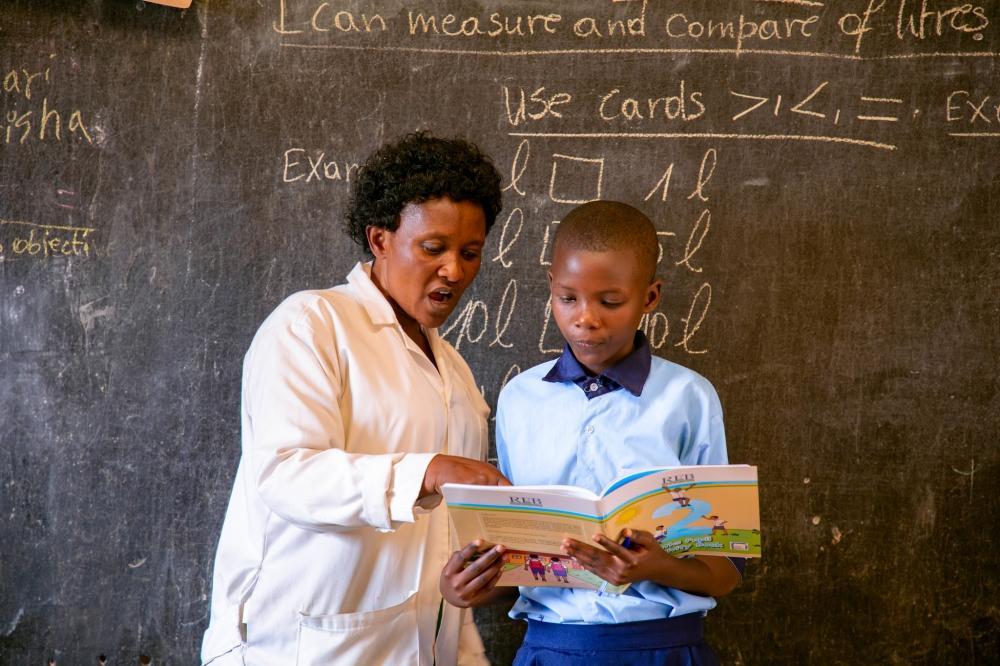Africa-Press – Rwanda. The government plans to spend over Rwf7 trillion in the proposed 2025/2026 fiscal year, according to the Ministry of Finance and Economic Planning (MINECOFIN).
Out of this amount, Rwf813 billion is allocated for the education sector, reflecting the government’s commitment to advancing education through the Ministry of Education and its affiliated institutions.
This article outlines the key projects and activities planned in the education sector for the upcoming fiscal year, highlighting the government’s priorities in infrastructure, quality education, STEM improvements, language proficiency, and digital transformation.
Infrastructure development
According to Charles Karakye, the Permanent Secretary in the Ministry of Education, there are various infrastructure developments expected to be done in the proposed budget.
These include the completion of G+3 school buildings in Gasabo and Rubavu districts, which will cost some Rwf5.9 billion, with the projects expected to be finalized in 2026.
Some Rwf 24.7 billion is set aside for the completion and renovation of Teacher Training Colleges (TTCs) and model schools where students practice before taking up teaching roles.
This also includes the construction of retaining walls in disaster-prone schools, particularly in Western Province, in partnership with districts and supported by the World Bank.
Other major infrastructure projects include the completion of the Nyagatare Veterinary Lab Complex, the construction of eight TVET Centers of Excellence and the installation of alarms in 100 secondary schools with Smart Classrooms to enhance security.
STEM and digital learning enhancements
To promote Science, Technology, Engineering, and Mathematics (STEM) education, the budget provides for 905 science kits for primary schools and 445 for secondary schools, 506 mathematics kits for secondary schools, and 17,050 laptops for 310 schools.
Karakye noted that these resources aim to bridge gaps where science laboratories are not available, while the laptops are in line with disseminating laptops countrywide, which is done based on available budget.
Quality education and capacity building
According to Karakye, the government will continue its commitment to quality education through the System Transformation Grant Project, which receives Rwf6.8 billion.
Additionally, Rwf 3.6 billion is earmarked for the School Resilience Project, initiated in partnership with FONERWA.
Through the Higher Education Council (HEC), the government plans to enhance quality assurance in polytechnics, continuations of accrediting new higher learning institutions (HLIs) and programs, assess the performance and ranking of all HLIs, and boost research and innovation outputs.
The Rwanda Education Board (REB) is also set to upgrade its digital platforms—including E-learning, ICTE MIS, and LTM MIS—and facilitate hosting fees.
Meanwhile, 3,584 science teachers will be trained in using science kits, and 15,000 primary teachers will be certified in pedagogy. There will also be training for pre-primary and primary teachers to identify and address disabilities early.
Language proficiency improvements
The Ministry of Education has allocated Rwf4.5 billion for the National Plan for Teaching and Learning of French. Additionally, REB will continue to train teachers in English proficiency to meet the requirements of Rwanda’s English-based curriculum.
“REB will continue training teachers in English, as the government aims to increase efforts this year to ensure they achieve the required level of proficiency. Since English is the language of instruction in schools, it is crucial for teachers to attain high proficiency,” Karakye said.
Payments and maintenance
Karakye noted that despite ongoing efforts to expand internet access in schools, high costs remain a challenge. In the proposed budget Rwf2.7 billion has been allocated for arrears and will continue to cover internet costs for 2,593 primary and 895 secondary schools.
Salaries for 157 Zimbabwean teachers currently teaching in Rwanda, as well as 50 volunteers from the Organisation Internationale de la Francophonie (OIF) are also included.
Moreover, the budget will continue to provide for 50 percent fee waivers for TTC students in pre-primary and primary teacher education, aimed at attracting talented students to the teaching profession.
All education institutions will get funds as follows. as follows: the Ministry will get Rwf 52.8 billion, HEC: Rwf 20.6 billion, REB: Rwf 48.3 billion, UR: Rwf 55.4 billion, RP: Rwf 25.6 billion, Rwanda TVET Board: Rwf 25.7 billion, and NESA: Rwf 17.5 billion.
It is worth noting that there are nine ongoing projects started in previous years, with the oldest dating back to 2019. Some projects are expected to extend until 2030, reflecting long-term investment in Rwanda’s education sector.
For More News And Analysis About Rwanda Follow Africa-Press






